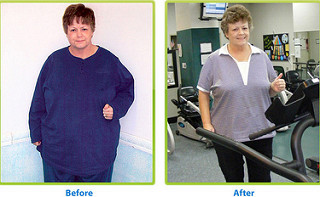Healthy Weight Loss Diet By The Federal Government
You may be surprised what the federal government has to say about healthy weight loss diet. The National Institutes of Health has some interesting ideas about what it takes to trim the fat. You may find that a number of these ideas conflict with what you’ve been hearing in the popular press.
For instance, you may have read that consuming red meat makes it more difficult for you to shed pounds. Actually, lean meat can be a critical component of a diet. While red meat, chicken, and pork may have cholesterol and saturated fat, they also have important minerals such as iron and zinc.
However, when eating meat, you should try to make sure that it is low in fat. You can choose from sirloin tip, round steak, and flank steak. You should also be aware of proper portion sizes—the average portion should be the size of a billfold folded over.

You may have heard that dairy products are fattening. However, low-fat milk, yogurt, and cheese have all the nutrients of whole milk products, with fewer calories and less fat. Dairy products are particularly beneficial for their calcium, protein, and vitamin D content.
Federal health officials are firm on the idea that fasting is not a good way to lose weight. It is far better to eat regular meals, although you might opt for smaller meals than you might ordinarily choose eaten more frequently. Meals help to kick-start your metabolism, enabling it to thrive throughout the day.
According to federal guidelines, children, teenagers, and senior citizens should have three servings of milk products each day, while adults age 19 to 49 should have two helpings daily. A serving would consist of a single cup of milk or yogurt, or 1-½ ounces of cheese.
If you have trouble digesting milk products, consider lactose-free items. You may also be able to get your calcium from juice or salmon, and your vitamin D from juice or cereal.
The federal government maintains that becoming a vegetarian will not automatically make you lose weight. However, studies have indicated that vegetarians do ingest fewer calories than meat-eaters and tend to have lower body mass indexes.
You might have been told that you should not eat nuts if you want to shed pounds. In actuality, a small amount of nuts can be an ingredient of your weight loss plan. While nuts are, generally speaking, high in fat, the fat is considered a healthy kind that does not harm the arteries.
Nuts can provide you with not only protein, but fiber and magnesium as well. But it is important that you eat nuts in moderation. This means consuming only about a third of a cup or less per day.
However, even as a vegetarian, you have to watch your intake of high-calorie food. Also, as a vegetarian you will have to find ways to ensure that you get plenty of iron, protein, calcium, and vitamin D, which might otherwise be missing from your diet.
As a result, it is important that you select vegetarian entrees that are not only low fat, but also high in nutrition. For instance, spinach will give you iron, broccoli can provide calcium, milk offers vitamin D, eggs provide vitamin B12, whole grains offer zinc, and eggs give you protein.
-
Strategies To Lose Weight When You Are Already Eating Right
You are doing everything
-
Solving The American Obesity Epidemic
We in the United States have set numerous precedents in our relatively
-
Have A Weighty Problem? Check Out These Ideas!
You don’t need to worry all night about how much trouble w
-
How to Effectively Lose to 10 Pounds
Magazines, web sites, televisions and public opinion in general lay a
-
Is it Safe to Lose Weight Fast?
This is a guest post from Tommy T. over at Fit Rank. Have you been
-
How to Lose Weight Around Your Thighs
In the next 2 minutes I am going to reveal to you a step by step repor
- DON'T MISS
- Four Proven Ways To Prevent Rapid Weight Gain During Your Summer Family Vacation
- Explaining the Controversial Fast Diet
- Devious, Ingenious, Desperate Strategies for Weight Loss
- SelfControl Equals Guaranteed Weight Loss
- How To Lose Weight Once And For All
- History of the Body Magic Shaper
- Slimming Pills – The Proper Way To Make Use Of Them And Obtain The Greatest Results
- Close Kept Secrets To Weight Loss Lesson 26
- Can’t sleep? You’re at risk for diabetes
- Opting For Surgery As A Treatment For Obesity




